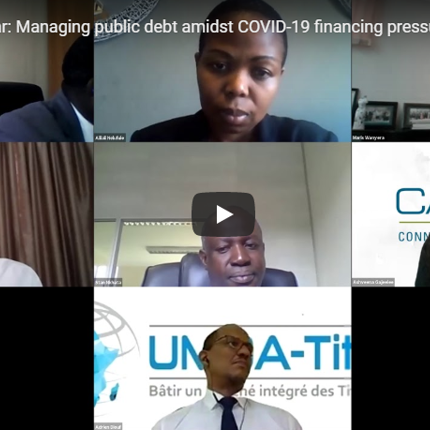On June 25, we hosted an online exchange on Managing public debt amidst COVID-19 financing pressures in Africa.
Public debt in Africa, has been on the rise since 2012. More noticeable was the increase in debt service cost, especially debt service cost owed to private creditors, which now holds more than 50% of total government debt. With lower concessional borrowing and raising non-Paris club creditors, debt vulnerabilities have increased. Prior to COVID-19, 19 sub-Saharan African countries have been classified as in debt distress, compared to seven countries in 2013.

The impact of COVID-19 has pushed African countries into a deep recession. Countries have, therefore, limited resources to respond to health and social needs.
The immediate responses to COVID-19, varies from reprioritising of the budgets, stimulus packages, and countries accessing International Monetary Fund (IMF) and World Bank borrowing facilities, on offer. The West African Monetary Union (WAMU), in collaboration with the Central Bank of West African States, introduced a COVID-19 Social Bond, to provide short term liquidity for member states. This arrangement was a joint effort between eight member states and 130 local Banks in the region. Post-COVID-19, the “COVID Social” Bonds will be gradually integrated into the conventional government issuance programme. This initiative was a clear indication how borrowers and lenders could work together, during a crisis, to address countries’ liquidity needs.
The impact of COVID-19 in Eastern and Southern African countries have not only led to higher budget deficits and a sharp increase in public debt, but to higher interest rates and the further depreciation of local currencies.
As loan facilities made available, could alleviate pressures over the short-term, the longer-term consequences remain a challenge. Rating agencies and countries agree, that the impact on an already weak sovereign fiscal position will intensify. Many African governments have limited financial, institutional capacity to absorb the long-lasting economic, financial and social threat of the COVID-19 shock, which will leave them vulnerable for future shocks.
A comprehensive strategy is needed to assist countries with unsustainable debt levels. Lower income countries, however, to address liquidity requirements, took advantage of the debt relief initiatives offered by IMF, G20 as well seeking debt relief from China. No debt relief is available for middle-income countries.
To address internal capacity constraints, countries have started to restructure their debt portfolios, communicating to foreign and local investors, adopting frameworks to manage contingent liabilities and focus on market mechanism for their borrowing requirements.
Countries should try to avoid the further escalation of the situation, as revenue collections may deteriorate even further. A further increase in borrowing requirements and more downgrades could have a severe impact on borrowing costs.
The situation amongst African countries are indeed serious and it will require a holistic approach, involving all stakeholders, to avoid the impact of the pandemic turning into a social and humanitarian crisis as well.
Watch the replay and access the presentations